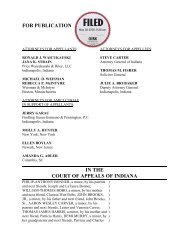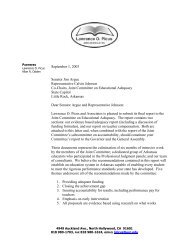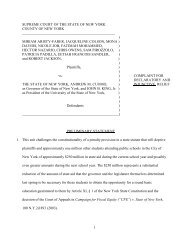WHAT IS ARKANSAS DOING TO CLOSE THE ACHIEVEMENT GAP?
WHAT IS ARKANSAS DOING TO CLOSE THE ACHIEVEMENT GAP?
WHAT IS ARKANSAS DOING TO CLOSE THE ACHIEVEMENT GAP?
Create successful ePaper yourself
Turn your PDF publications into a flip-book with our unique Google optimized e-Paper software.
examined the educational policy literature on the achievement<br />
gap to identify the interventions that have been proven to work<br />
in reducing achievement disparities and to highlight effective<br />
strategies that have already been adopted in Arkansas.<br />
We find that Arkansas has already done a great deal to improve<br />
facilities, curriculum and instructional strategy. Because successful<br />
systems are already in place, we believe it is unlikely that new<br />
facilities enhancement or new curricular or instructional reform<br />
will have much additional impact on the achievement gap.<br />
Opportunities for Enhancing<br />
Existing Successful Interventions<br />
Arkansas has begun promising work and should deepen its<br />
commitments in early childhood education, teacher quality, and<br />
high-quality charter schools.<br />
More than any other intervention, early childhood education<br />
has been proven to close the achievement gap. Arkansas has<br />
developed a high-quality pre-kindergarten initiative available to<br />
all needy families. We believe the crucial next step is to broaden<br />
participation in these programs. If all the families of three- and<br />
four-year-olds who are eligible for free preschool put them<br />
in quality pre-K programs, it would dramatically reduce the<br />
achievement gap. To achieve higher rates of pre-K attendance, we<br />
recommend a major public communications effort.<br />
Educational research has also made it clear that teacher quality is<br />
the key to student achievement and that low-income and minority<br />
children tend to have less experienced, less well-qualified teachers.<br />
State policymakers in Arkansas should be applauded for raising<br />
teacher salaries and providing financial incentives for teachers to<br />
move to high-need school districts. Arkansas has also become a<br />
national leader in developing a longitudinal tracking system which<br />
allows the value added to students’ learning to be calculated. We<br />
recommend the state aggressively implement the longitudinal<br />
tracking system and use this data to improve the way Arkansas<br />
teachers are educated, distributed, and developed in service.<br />
The only elements of school choice that have shown any<br />
convincing evidence of success in closing the achievement gap are<br />
certain charter schools with distinctive traits: extended learning<br />
time, rigorous professional development, and strong school<br />
leadership. Such traits are found in the KIPP charter schools such as<br />
the one now in operation in Helena-West Helena. We recommend<br />
that any new charter schools be focused on reducing the racial<br />
and socioeconomic achievement gap. Moreover, we contend<br />
that the state board of education should review all charter school<br />
applications for evidence that they employ methods for closing the<br />
achievement gap that are backed by scientific research.<br />
Signifi cant Opportunities<br />
for New Interventions<br />
Most importantly, we identify four extremely promising areas<br />
in which Arkansas has taken only first steps. We believe that<br />
serious new investments in the following areas will have the most<br />
dramatic impact on the achievement gap.<br />
Research shows that students with health challenges spend<br />
less time in school, resulting in lower levels of achievement, a<br />
greater likelihood of grade retention, and lower graduation rates.<br />
Because low-income, African American and Latino students are<br />
more likely to have health problems, student health programming<br />
should be a major component of a state achievement-gap<br />
reduction plan. We recommend Arkansas re-introduce state<br />
funding to support school-based health clinics for under-served<br />
students or promote their development through the Coordinated<br />
School Health Initiative.<br />
Research tells us summer learning loss and unproductive<br />
time between 3 and 6 p.m. are key causes of the achievement<br />
gap. High quality after-school and summer programs can play<br />
an important role in closing the achievement gap. However,<br />
Arkansas lacks a statewide funding and quality assessment system.<br />
As a result, about one-fifth of Arkansas students are latchkey<br />
children and a much larger number lack access to academically<br />
rich experiences after school and in the summer. By creating task<br />
forces to develop policy frameworks, state policymakers have<br />
recognized the promise these programs have. We recommend the<br />
state aggressively implement any forthcoming recommendations<br />
of the Governor’s Task Force on After-School and Summer<br />
Programs.<br />
The research carried out on class-size reduction in Tennessee,<br />
a state with many demographic similarities to Arkansas, shows<br />
that class sizes of 13-17 students in the early grades significantly<br />
improved students’ test scores and graduation rates, especially<br />
among African American students. While an expensive endeavor<br />
when embraced statewide, we recommend state funding for<br />
reduced class sizes targeted to schools with high proportions<br />
of students from low-income, African American, or Latino<br />
families.<br />
Finally, programs that engage parents to become knowledgeable<br />
and engaged in their children’s education, such as Arkansas’s<br />
HIPPY program, have been proven to close the achievement<br />
gap. Through home visits and one-on-one training, children<br />
as well as parents gain self-confidence. Arkansas can build on<br />
these targeted successes to encourage broader communitybased<br />
organization to build social capital among parents. We<br />
recommend the state sustain the successes achieved by Winthrop<br />
Rockefeller Foundation’s 21st Century Programs.<br />
Conclusion<br />
Arkansas has done some great things in recent years to<br />
improve education for our children. However, there is much<br />
more to do. Those who have worked hard to reform Arkansas’s<br />
education system in this decade cannot rest on their laurels. In<br />
this study, we have suggested several directions, some familiar<br />
and some new, to build on our recent successes. We hope this<br />
study will generate discussion and action among policymakers,<br />
parents, and citizens who are interested in improving educational<br />
outcomes for all children, regardless of their income, race, or<br />
geographic location.<br />
3






